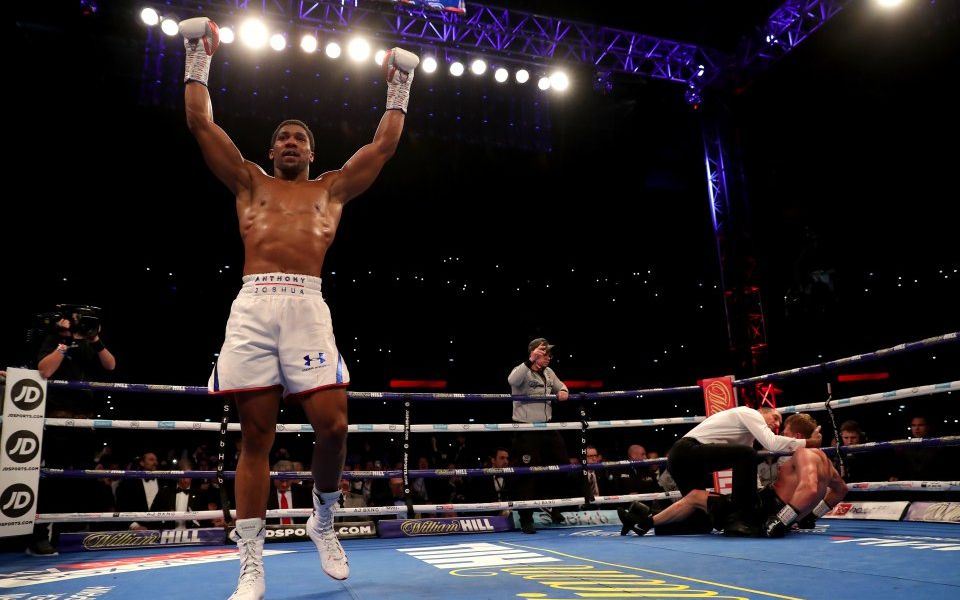Anthony Joshua proves the heavyweight division is built on his brilliance with brutal knockout of Alexander Povetkin

When the referee stepped across Anthony Joshua as fallen challenger Alexander Povetkin crashed on the canvas for the second time in a matter of minutes on Saturday night, it was clearer than ever that the world champion remains the defining figure in heavyweight boxing.
The match-up had always been an awkward one for Joshua. Povetkin is a master of ring-craft while his devastating overhand punches are especially dangerous to taller fighters, as both David Price and Johann Duhaupus discovered to their detriment in recent contests.
So it was perhaps little surprise that Joshua's mandatory defence of his four titles unfolded in tentative fashion at first, with the canny Russian keeping his distance before connecting powerfully with a short left hook that bloodied the Briton's nose at the end of the first round.
The second round also belonged to Povetkin, with the 2004 Olympic gold medallist rattling his opponent with a couple of heavy punches, before Joshua adapted and changed the direction of the fight.
Read more: Joshua must clear Povetkin hurdle to get back on track
Six matches into defending heavyweight titles, Joshua is now a different beast to the devastating challenger that first rose through the division with explosive early-round victories and uncompromising punches from both fists.
Alongside such power, there is now a sense of pragmatism and tactical intelligence to his game that served him well at the weekend and against Joseph Parker in March. Joshua has evolved from merely exchanging blows with elite-level boxers to reading in-ring situations and developing game-plans to counter even dangerous pressure fighters like Povetkin, the third highest ranked heavyweight according to Ring magazine.

Joshua still holds three of boxing's biggest belts after defeating Povetkin in front of 80,000 fans (Source: Getty)
Rather than pursuing head shots against a slippery opponent with superior movement, Joshua connected instead with body shots, exhausting Povetkin across four rounds, before knocking him out in the seventh.
It was the kind of finish that fans have wanted to see from Joshua after cautious defences since last year's landmark victory over Wladimir Klitschko. Joshua hit Povetkin with a devastating right hook set up by a series of strong shots with his left fist, before completing his victory with a merciless volley of punches after his opponent wearily returned to his feet. Joshua combined his newly developed tactical awareness with the kind of glorious finishes that made his name.
Read more: What mainstream sports can learn from KSI v Logan Paul
The personal stories and dramas of the other heavyweights sitting ringside at Wembley, such as Tony Bellew, Dereck Chisora and Dillian Whyte may be engaging enough to hardcore fight fans, while both Tyson Fury and Deontay Wilder watching at home have notable followings in a sport filled with trash talk, egos and extensive deal making, but it is the comparatively humble Joshua who dominates media coverage.
However much his rivals may hate it, the real story of the night outside of the ring was the 80,000 fans in attendance, coming to watch Joshua take on a highly talented yet little-known mandatory challenger.
Some in the crowd may not have even known the names of all of the boxers gathered ringside. Instead, they turned up to see Joshua, coming on a mercilessly wet September night to watch an equally unforgiving British world champion from Watford continue his own narrative to greatness at what has become his home ground.
Normally stories and styles make fights, but with Joshua it is his name alone that dictates attendance numbers. Even when Wembley doesn't sell out, Joshua manages to attract crowds that dwarf those of his competitors. The much-hyped bout between Wilder and Fury in December is expected to take place in Las Vegas in arenas a quarter of the size of Wembley. Wilder reportedly made £1.6m from his victory against Luis Ortiz; Joshua by contrast is thought to have made £20m this weekend alone.
Across social media and American fan forums, Joshua still has detractors. It is the usual consequence of having such stratospheric success, especially after only 22 fights from a British heavyweight who doesn't romanticise Las Vegas and resists the allure of establishment US broadcasters and promoters.

Joshua changed his approach mid-way through the fight and landed numerous body blows before for the knockout punch (Source: Getty)
Unfortunately for his critics, it is Joshua's popularity that fuels the fire of the most heated heavyweight rivalries, with every other contender dancing to his tune. Wilder-Fury is only as compelling as it is because of the potential for one them to face Joshua next April at Wembley.
Now that he has successfully defended his belts, Joshua should look to the future and try to define his legacy before being shackled by another series of mandatory defences. A unification fight with the victor of Wilder-Fury remains his best move, but only on terms that suit his position in the division. After all, the WBC heavyweight belt, the final title eluding the British champion, is only relevant to millions of fans as it completes Joshua's personal story, not because of who else currently wears it.